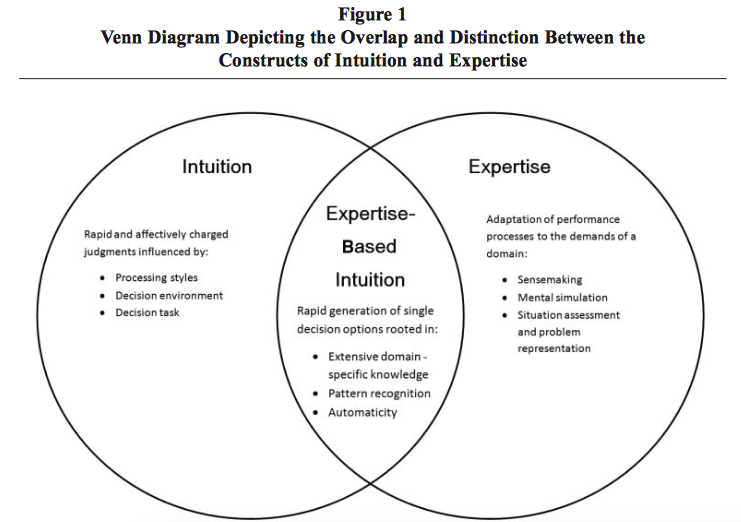Summary:
The authors of this review examined literature on intuition, expertise,
and how expertise-based intuition plays a role for decision makers in organizations.
According to the authors “Expertise is at the root of effective intuitive
decision making in complex organizational settings, and therefore understanding
how to develop and manage effective intuition in organizations is, in part,
linked to an understanding of human expertise.” Expertise-based intuition is different because
it draws on domain-specific knowledge to answer questions. Expertise and
intuition are not synonymous.
However, a person cannot rely on intuition alone. Overlaying on
intuition can also be a source of error. Instead, an organization should set
performance and developmental mechanisms for expertise-based intuition. The literature points to several conditions
where intuition is more likely to be accurate: characteristics of the decision
makers, the decision task, and the decision environment. A person’s intuition
is rooted unconsciously, which provides them with a quick judgment on complex
patterns of relationships. Although, if the decision maker is taken out of
his/her expertise, then the likelihood of his/her intuition decreases.
Since intuition is based from expertise, experts possess both the
experience and knowledge to take advantage of the intuition process. Using
expertise and naturalistic decision making (NDM) helps decision makers explain
the role of intuition in the decision making process. NDM is a type of decision
making research that aims to understand “the way people use their experience to
make decisions in field settings.” Tables 2 and 3 provide a summary of the
mechanisms of performance and the mechanisms of development.
Critique:
While the authors adequately explained why intuition plays a large role
in organizations and how to improve intuitive expertise-based decision making,
they only laid out the existing knowledge based on management science. Looking
at intuition from a different field, such as organizational leadership or
intelligence, could cause different results. In addition, the authors did not
touch on the level of expertise needed to be considered an expert, what
situations would call for intuitive decision-making, and how people react to
the intuitive expertise-based decisions.
Source:
Salas, E., Rosen, M. A., & DiazGranados, D. (2010).
Expertise-Based Intuition and Decision Making in Organizations. Journal
of Management, 36(4), 941–973. doi:10.1177/0149206309350084







Joy,
ReplyDeleteHow often do you find yourself using intuition while creating an intelligence product and do you believe there is a place for it when creating an estimate?
Are the mechanisms to develop listed in the final two tables ranked in any way, or are they simply a list?
ReplyDeleteHarrison,
ReplyDeleteI have used intuition a small amount when creating an intelligence product. However, I can see intuition playing a larger role in the intelligence community. I could see myself using it more as our work progresses.
John,
The mechanisms listed above were not ranked, merely just collected during the authors literature review.
While the topic of Big Data is broad and encompasses many trends and new technology developments, she managed to give me a very good overview of what she considers to be the top ten emerging technologies that are helping users cope with and handle Big Data in a cost-effective manner.
ReplyDelete